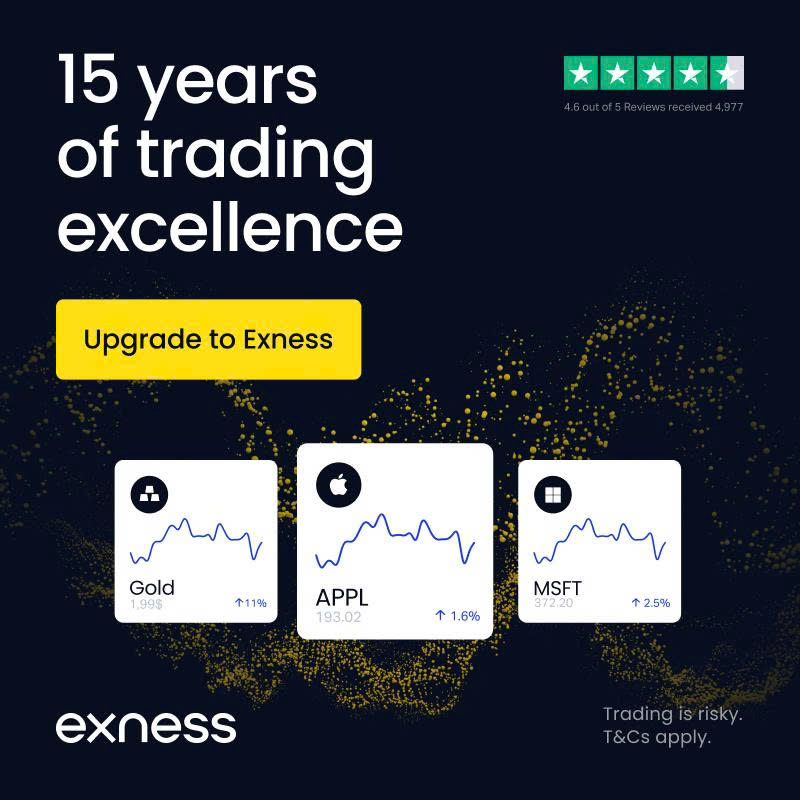
7 minute read
Is Forex Trading Legal in India? A Comprehensive Guide
from Forex Trading India
Forex trading, the act of buying and selling currencies on the global market, has gained significant attention worldwide, including in India. However, the legality of forex trading in India is a topic shroudedDaily Exchange Rate Updates in confusion for many aspiring traders. With strict regulations and a complex financial ecosystem, it’s crucial to understand the legal framework, opportunities, and limitations of forex trading in India. This article dives deep into the question, “Is forex trading legal in India?” while providing a clear guide for beginners and seasoned traders alike.
Top 4 Best Forex Brokers in India
1️⃣ Exness: Open An Account or Visit Brokers 🏆
2️⃣ XM: Open An Account or Visit Brokers 💥
3️⃣ JustMarkets: Open An Account or Visit Brokers ✅
4️⃣ Quotex: Open An Account or Visit Brokers 🌐
What is Forex Trading?
Forex, or foreign exchange trading, involves speculating on the price movements of currency pairs, such as USD/INR or EUR/USD. Traders aim to profit from fluctuations in exchange rates. The forex market is the largest and most liquid financial market globally, with a daily trading volume exceeding $7 trillion. Its decentralized nature and 24/5 accessibility make it attractive to traders worldwide.
In India, however, forex trading operates under strict oversight due to the country’s economic policies and regulations. Let’s explore the legal landscape to determine whether forex trading is permissible in India.
The Legal Status of Forex Trading in India
The legality of forex trading in India is governed by the Foreign Exchange Management Act (FEMA), 1999, enforced by the Reserve Bank of India (RBI). FEMA regulates all foreign exchange transactions in India, including forex trading. Here’s a breakdown of the legal framework:
Retail Forex Trading RestrictionsRetail forex trading, where individuals speculate on currency pairs for profit, is largely restricted in India. The RBI does not permit Indian residents to engage in speculative forex trading through international brokers unless specific conditions are met. This restriction aims to control capital outflows and maintain the stability of the Indian Rupee (INR).
Authorized Trading PlatformsForex trading is legal in India only through RBI-authorized platforms or dealers, such as registered stockbrokers or financial institutions. The Securities and Exchange Board of India (SEBI) regulates forex trading on Indian exchanges like the National Stock Exchange (NSE), Bombay Stock Exchange (BSE), and Metropolitan Stock Exchange (MSE). These exchanges offer limited currency pairs, such as USD/INR, EUR/INR, GBP/INR, and JPY/INR, for trading in the form of currency derivatives (futures and options).
Permitted Currency PairsIndian residents can trade only INR-based currency pairs on SEBI-regulated exchanges. Trading non-INR pairs (e.g., EUR/USD) is not allowed for retail traders in India, as it violates FEMA guidelines.
Overseas Brokers and RemittancesUsing international forex brokers to trade non-INR pairs is considered illegal under FEMA unless the trader complies with the Liberalised Remittance Scheme (LRS). The LRS allows Indian residents to remit up to $250,000 per year for permissible transactions, including investments. However, using LRS funds for speculative forex trading with overseas brokers is a gray area and often discouraged by the RBI.
Penalties for Non-ComplianceEngaging in unauthorized forex trading, such as using unregulated international brokers, can lead to penalties under FEMA. Violators may face fines, confiscation of funds, or legal action. The RBI and Enforcement Directorate (ED) actively monitor such activities to curb illegal capital flows.
Who Can Trade Forex in India?
While retail forex trading is restricted, certain entities and individuals can participate in forex trading under specific conditions:
Hedgers: Businesses, exporters, and importers can use currency derivatives to hedge against exchange rate risks. For example, an exporter expecting USD payments can trade USD/INR futures to lock in exchange rates.
Institutional Investors: Banks, financial institutions, and authorized dealers can engage in forex trading under RBI guidelines.
Retail Traders: Indian residents can trade currency derivatives on SEBI-regulated exchanges through registered brokers. This requires a trading account with a SEBI-licensed broker and compliance with exchange rules.

✅ Join Exness now! Open An Account or Visit Brokers 👈
How to Trade Forex Legally in India
To trade forex legally in India, follow these steps:
Choose a SEBI-Registered BrokerSelect a reputable broker registered with SEBI and a member of the NSE, BSE, or MSE. Popular brokers include Zerodha, ICICI Securities, and Angel One.
Open a Trading AccountOpen a trading and demat account with your chosen broker. Provide KYC documents, such as Aadhaar, PAN, and bank details, to comply with regulations.
Trade INR-Based Currency PairsFocus on currency derivatives (futures and options) for INR pairs like USD/INR, EUR/INR, GBP/INR, and JPY/INR. These are available on Indian exchanges and are fully regulated.
Understand Margin and LeverageCurrency derivatives trading involves margins and leverage. Ensure you understand the risks, as leverage can amplify both profits and losses.
Stay Compliant with RBI and SEBIAvoid using unregulated international brokers or trading non-INR pairs, as these activities violate FEMA guidelines.
Benefits of Forex Trading in India
Despite the restrictions, legal forex trading in India offers several advantages:
Regulated Environment: Trading on SEBI-regulated exchanges ensures transparency and investor protection.
Hedging Opportunities: Businesses can mitigate risks associated with currency fluctuations.
Accessibility: Currency derivatives are accessible to retail traders with low capital requirements.
Market Stability: RBI’s oversight ensures a stable trading environment, reducing the risk of fraud.
Challenges of Forex Trading in India
While forex trading is legal within the regulatory framework, traders face certain challenges:
Limited Currency Pairs: The restriction to INR-based pairs limits diversification opportunities compared to global markets.
High Volatility: Currency markets can be volatile, and leverage increases the risk of significant losses.
Complex Regulations: Navigating FEMA and RBI guidelines can be daunting for beginners.
Broker Limitations: Not all SEBI-registered brokers offer robust platforms for currency trading, limiting options for traders.
Common Myths About Forex Trading in India
Myth: Forex trading is completely illegal in India.Fact: Forex trading is legal when done through SEBI-regulated exchanges and INR-based pairs.
Myth: International brokers are safe for Indian traders.Fact: Using unregulated international brokers violates FEMA and can lead to legal consequences.
Myth: Forex trading guarantees quick profits.Fact: Forex trading involves high risks, and success requires knowledge, strategy, and discipline.
Tips for Aspiring Forex Traders in India
Educate Yourself: Learn about currency markets, technical analysis, and risk management before trading.
Start Small: Begin with a small capital to minimize risks while gaining experience.
Use Demo Accounts: Practice trading with demo accounts offered by SEBI-registered brokers.
Monitor Economic News: Stay updated on global and Indian economic events that impact currency prices.
Consult a Financial Advisor: Seek professional advice to ensure compliance with regulations and optimize your trading strategy.
The Future of Forex Trading in India
The forex trading landscape in India is evolving. The RBI and SEBI are gradually liberalizing regulations to encourage participation while maintaining economic stability. For instance, the introduction of currency futures in 2008 and options in 2010 marked significant steps toward expanding forex trading opportunities. As India’s economy grows and integrates with global markets, we may see further relaxation of restrictions, potentially allowing more currency pairs or retail trading options.
However, any changes will likely prioritize capital control and investor protection. Aspiring traders should stay informed about regulatory updates and focus on legal avenues to participate in the forex market.
Conclusion
Forex trading is legal in India, but it comes with strict regulations under FEMA and RBI guidelines. Retail traders can participate through SEBI-regulated exchanges, trading INR-based currency derivatives. While opportunities exist for hedging and speculation, traders must avoid unregulated international brokers to stay compliant. By understanding the legal framework, choosing authorized platforms, and adopting a disciplined approach, Indian traders can navigate the forex market effectively.
If you’re considering forex trading in India, start by researching SEBI-registered brokers and educating yourself about the market. For more details on regulations, visit the RBI website rbi.org.in or consult a financial advisor. Stay informed, trade responsibly, and ensure compliance to make the most of forex trading in India’s regulated environment.
✅ Join Exness now! Open An Account or Visit Brokers 👈
Read more:

